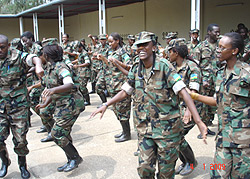Like a soldier, Lynette Umutonishe majestically matches toward Col Kamili Karege, the former commandant of Gako Militarry academy. She stumps her feet and simultaneously salutes as she is handed a certificate at the completion of a ten-day civic education programme—popularly known as Ingando.


Like a soldier, Lynette Umutonishe majestically matches toward Col Kamili Karege, the former commandant of Gako Militarry academy.
She stumps her feet and simultaneously salutes as she is handed a certificate at the completion of a ten-day civic education programme—popularly known as Ingando. She was among the over 70 youth in Diaspora who attended the training which has become popular in Rwanda.
"The royal institutions which had held Rwanda together for centuries were abolished which is why we took the lead in mobilizing and training communities on unity, reconciliation and related topics,” explains Fatuma Ndangiza, the Executive Secretary of the National Unity and Reconciliation Commission (NURC).
"Different central themes include analysis of Rwanda’s problems, political history and socioeconomic issues, human rights, and leadership, not only in the Rwandan context but also in Africa as a whole,” Ndangiza says.
The programme which has now expanded to include school-going youth and students in secondary and tertiary levels has also been extended to the informal sector, and other social groups such as inmates, community leaders, and women.
Today, Ingando is organised countrywide and entails residential camps, bringing together classified groups of people for sessions running for as short as one week and others that last 3 months.
The growth of several community based reconciliation associations involving genocide survivors and perpetrators, and people with family members in prison is an indicator that reconciliation is taking place at the community level.
And as Ndangiza confirms, this provides space where students from different backgrounds get together, promote reconciliation in learning institutions.
In this way, their teaching does not just end at the Ingando but is carried forward into their daily lives. By their very nature, Ingando is particularly more popular among younger people given their interactive nature which is very participatory.
Most of the youth recently interviewed at the Military Academy in Gako were excited about meeting and re-uniting with new and old friends.
"The idea of attending a "solidarity camp” far away from home with hundreds of other young people is very exciting” says Antoine Musabyimana, one of the participants.
He admits that there is a lot of merit in developing the programme which specialises in building leadership skills and creating a spirit of public service among students and youth.
The future of peace in Rwanda will depend as much on individuals and their communities as on government policies and direction. This is particularly true when it comes to eliminating the genocide ideology.
While the seminars and consultations are useful, their impact is not easy to measure and it is difficult to ascertain the extent to which the ideas that are taught are consciously internalised, applied and transferred.
There is sufficient information to suggest that given the correct amount of support, the communities are ready to carry forward reconciliation activities on their own.
In Rwanda, ordinary people are more in contact with cultural institutions than political ones because when disputes arise in the community, the first points of contact are the Abunzi (mediators).
It is only when the Abunzi fail, that the cases are transferred to the courts. When prisoners are released, they go through the Gacaca process as a transitional phase before they are integrated back into their communities.
Clearly Rwanda has succeeded in integrating culture into the reconciliation process with many of its interventions modelled on cultural concepts and practices.
Contact: poetic_african@yahoo.com


